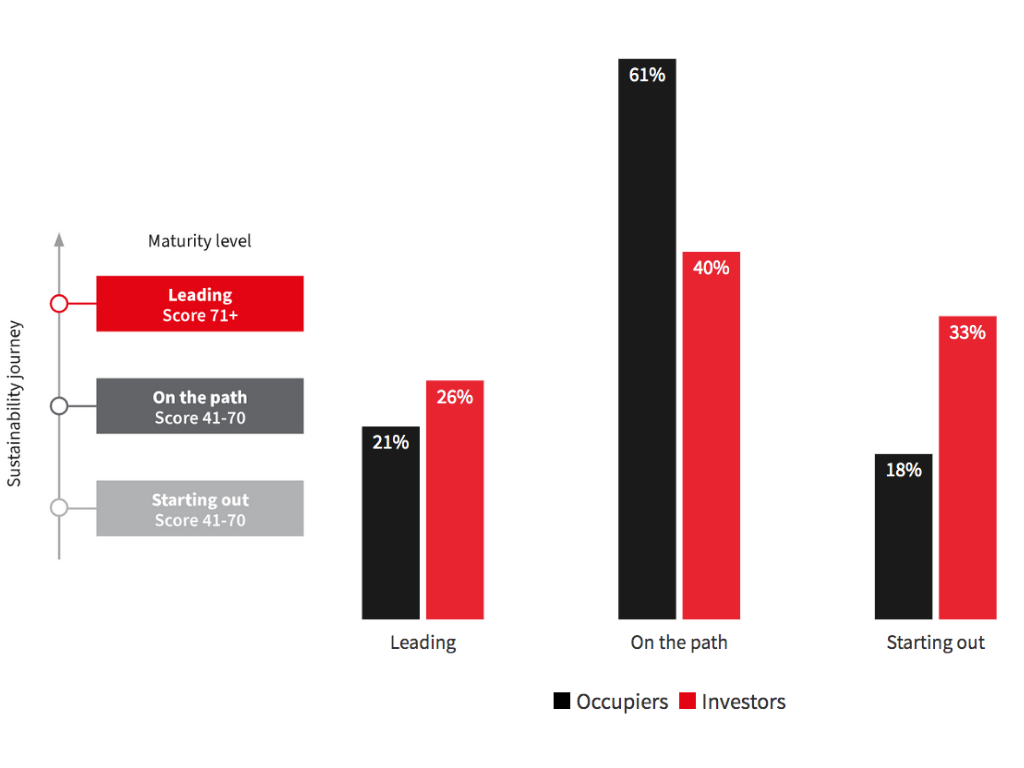3 Mins Read
According to insights from the JLL Asia Pacific ‘Sustainable Real Estate: From Ambitions to Actions’ report, due to corporate occupiers’ commitment to double net zero adoption by 2025, 50% investors will priortise green-certified real estate.
The aim of the study by JLL, a professional services firm that specializes in real estate, was to take an in depth look into the sustainability ambitions of APAC corporations and their associated actions and effectiveness of the same, thus surveying over 550 corporate real estate leaders.
The online study was conducted with 478 occupiers and 76 investors from countries across the APAC region including Australia, China, India, Japan and Singapore.
A New Era in Regional Real Estate
The findings revealed that a majority of APAC companies (70%) are ready to pay a rental premium to lease sustainability-certified buildings. For those who presently lease space in a green building, the majority of them are already paying a rental premium of 7-10%, a benchmark that is established for sustainable leasing in the future.
These commitments echo with real estate sustainability developments that have been happening across Asia Pacific where 40% have embraced net zero targets. Another 40% are set to adopt these targets by 2025.
In addition, the regional real estate decarbonization drive is urging 80% of corporate occupiers to choose locations that help them limit carbon emissions. On the other hand, 65% of investors are looking at investing in green buildings.
Around 90% of companies in this region believe that emissions released from real estate need to be tackled, proving to be a way forward to achieve net zero. This will be a new era in regional real estate portfolio leasing and investment.
“For companies operating in Asia Pacific, any meaningful reduction in carbon footprint is tied directly to real estate,” CEO APAC of JLL, Anthony Couse, said in a statement. “Corporate occupiers will increasingly demand real estate solutions that complement their sustainability agenda. This will lead investors to prioritise green investments, propelling the real estate industry transformation towards future-ready green buildings.”
Read: Carbon Bank Buildings? How Engineered Timber Could Make Our Cities Absorb CO2
Few ‘Leading’ Companies On Track To Meet Carbon-Reduction Targets
The survey highlighted the organisations’ sustainability journeys with 21% of corporate occupiers and 26% of investors recognized as ‘leading’ in their category. This was a term defined in the survey itself based on the strength of the companies’ sustainability goals. These goals will help them achieve carbon emissions reduction targets, thus scoring above 71 out of 100 total possible points, would make one ‘leading’ in a category.
Given that the number is small, a majority of organizations need to buck up and start taking action. For instance, just 36% of occupiers have committed to act on the emissions released by their suppliers, customers as well as their own operations.

Corporate occupiers will increasingly demand real estate solutions that complement their sustainability agenda. This will lead investors to prioritise green investments, propelling the real estate industry transformation towards future-ready green buildings
Anthony Couse, chief executive officer APAC of JLL
Chief research officer, JLL Asia Pacific, Roddy Allan, said: “Across Asia Pacific, society is shifting towards an emphasis on green and sustainable spaces in a bid to address the concerns on climate risk, and companies are willing to pay a premium to meet new demands. There is now a heightened responsibility among businesses to take demonstrable actions with their commercial real estate portfolio, which will increasingly rely on partnership between occupiers and investors to translate sustainability ambitions into actions.”
Read: Low-Carbon Buildings Grown By Bacteria Is Becoming A Reality
Obstacles In The Way
Apart from firmer commitments needed from companies, around 70% of occupiers expressed a lack of incentives from governments and backing from landlords as obstacles for achieving their net-zero carbon goals.
Plus, 3 out of 4 companies recognized the lack of technological infrastructure to meeting their sustainable real estate goals.
Read the full report here.
Lead image courtesy of JLL.




